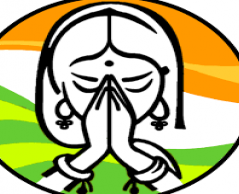
Ghazals Of Ghalib
The Almighty Of Rekhta
Mirza Asadullah Khan (Ghalib)-27-12-1797(Agra) To 15-02-1869 (Delhi)

Interpretation-Ghazal-81
1.
The flowers are laughing in the fervour of joy at seen him, and his stupidity and foolish behaviour,
But the nightingale gives his life in the deceit and illusion that the quality of faithfulness is firm and established in the flowers.
(In every lover's eyes, every beloved is an undying being.)
(It is only the nightingale's romantic folly that brings us the glory of flowers in the spring.)
2.
May the freedom of spring-breeze be auspicious for those ardent for flower-scent,
For the links in the net of ardour of lie broken.
(The kindness of the spring-breeze is now the flower-scent itself is reaching the ardent ones. Now there is no longer any need for them to reach the flowers itself.)
(The desire for a stroll among the flowers was a net. Those whose hearts were given to recreation were ensnared in this net. The forceful hand of the time broke this noose apart. All the prisoners emerged from the net. Now in the garden none is to be seen except the spring-breeze. It alone, in complete freedom, has become master of the garden. May this freedom be auspicious for it.)
(The lover knows the hollowness of his words, even as he speaks them. And we share his painful awareness.)
3.
People have through error considered to be a wave of colour and have become infatuated with it,
The colours of the flowers are in reality flower's blood-dripping lament and heart-lacerating complaint.
(He laments the flower's ill-fortune, it was not the flower's colourfulness, but rather it was the blood-dripping lament of its complaining lips.)
(When full bloomed, flowers grieve over its own approaching end.)
4.
How fortunate is that rival who in the intoxication of drunk-ness,
Would put his head on the feet of beloved and present his longing.
(For the beloved the simile of a flower has been used, and for the lover the simile of the shadow of the stem of the rose.)
(The way the flower's shadow bends toward the flower's feet.)
(One of the traditional forms extreme supplication is the humbly fall at someone's feet and then refuse to rise, or even to release the victim's ankles, until one's request is granted.)
5.
Spring has created flowers for you so that their scent could be extracted and rubbed on your body, and in your embrace,
For this reason, the essence of flowers is my rival, and I am envious to its success.
(Flowers would become a garland for your neck, and remain in contact with you and sleep with you all night. It seems that flowers are my rival.)
(I am so mad with passion that I see all sorts of implausible things as rivals.)
6.
These two things make me ashamed before the spring breeze,
If my glass is empty of wine, and there is never any ardent desire for a stroll in the garden.
(He looks at his previous lavish life and present sorrow.)
(People disapprove of my drinking wine and strolling in the garden. But if I do not do that, then I feel ashamed before the spring breeze.)
(He described his wrecked, lost and ruined heart.)
7.
Since your pride does not want your lover to be infatuated with any other beloved,
The colour of flowers, in my eyes, has no more value than blood.
(The beloved's proud beauty has made such a deep effect on my heart that the coquetry of flowers do not please me.)
(It is easy to imagine that such commanding beauty might not brook any competition. This exclusiveness might be due to the beloved's overpowering grandeur and radiance in itself, or it might be an effect of her watchful hyper-jealousy, that requires the lover not to enjoy even the colour of a flower.)
8.
When a flower blooms, then other buds consider that you have manifested yourself in the guise of a flower.
The flower begin to bloom in sequence, and seeing this sequence, it is proved that one flower keeps running after another flower.
(Seeing one flower in bloom, then when the next flower emerges, it has the illusion that you have manifested yourself.)
(We might have thought that flowers bloomed at random, but now we know that to this day, they bloom in pursuit of each other, reaching for each other, under the illusion that they are thus approaching the beloved.)
(A canny poet like Ghalib leaves the door ajar, so that both possibilities can meet and mingle, as they do here.)
9.
Oh Ghalib, I have a longing to embrace that one the picture of whom,
The thought of whom, is the ornament of flower's collar.
(That true beloved, the thought of whom the rose has made an ornament for its collar, I want to embrace that one.)
(Ghalib, I long to embrace her, the thought of whom the flowers on the dress of flowers.)
(This verse has its complexities wrapped within such lovely simplicities.)
(I am becoming mad in ardour for union with my beloved, the one for whom beloveds die of love. The true beloved can also be intended.)
-------

